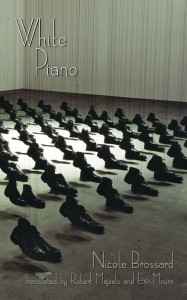 White Piano
White Piano
by Nicole Brossard
translated by Robert Majzels and Erin Moure
Coach House Books, March 2013
112 pages / $15.95 Buy from Coach House Press
I first read Nicole Brossard’s White Piano almost two months ago. Without a doubt I was struck by it, it carried a heavy feeling, a sort of pleasure in its musicality, its language, the space that the pages throughout the book suggest. As such, I was struck with only this feeling, without much to come to in terms of words with which I could discuss it. It’s lingered, this feeling, in my head, through my body, and its created a desire to attempt to express, in some capacity, what it is within the book that I find notable, powerful, pleasurable.
This is not a new feeling to me when it comes to poetry. Despite my incessant readings on poetics, despite the fact that I devour huge amounts of poetry, I can barely ever articulate what it is that’s moving me. The feeling I get after reading good poetry is similar to a sort of visceral reaction that can be present after really good sex, or maybe a really intense roller coaster; the way the water of the ocean feels washing over you when the sun is out and there’s a warmth in the air, this reality of being overcome–almost a sort of satisfaction. This bodily response is inherently against language, of course, and when Blanchot writes over and over again that the writing of the disaster, that “[neither] the sun, nor the universe helps us, except through images, to conceive of a system of exchanges so marked by loss that nothing therein would hold together and that the inexchangeable would no longer be caught and defined in symbolic terms.” There is a futility in the desire to re-create a language based experience in language.
I find it also near impossible to write about music. Poetry isn’t music, though there are certain similarities, and these similarities shine through a level of affect, this bodily heaviness, this feeling that refuses semantic indulgence.
My initial encounter with Nicole Brossard came with her novel Mauve Desert, a masterpiece of poetic fragmentary narrative, a novel that in 2011 filled me with a repeated desire to write, and to write again, and the necessity of narrative, even within some construct of the idea of being a poet. It would have been easier, perhaps, to write about Mauve Desert. Fiction is easier, I think, because there is a narrative, and it’s easier to discuss narrative, because at least in the Western world, throughout the 20th & 21st centuries, we have been taught to conceive of the world as nothing but narrative; rather it be fragmented, straight-forward, grand, etc. The promise of Post-Modernism was to lay claim to the fact that the grand narratives that Modernism presented were over, or if not over, never present in the first place. But our own language, our own modes of interpretation, are still stuck in this vein. We are fractured, but there has to be a larger goal. A five year plan, a path to follow from the cradle to the grave, advancement in our work places. This path forward.
But sometimes poetry refuses it. It insists on a static. I don’t say this in a bad way, because when one is obsessed with moving forward, there’s a trite idiomatic insistence that we must take time to pause and actually appreciate what’s around us.
your indiscreet questions your ideas of having a blast
it’s so simple, and pain we can recount
to substitute the carnivores
Part of Brossard’s poetic toolbox includes formal signifiers of performativity. She is not necessarily entirely aligned with what have been called the French ‘Neo-Formalists,’ but this tangential connection is what initially brought me to her work. While her page is not as topographic as, say, Anne-Marie Albiach, she does use tools to expand the performance of the text on the page itself. A textual performativity serves, in my reading, to heighten the experience of reading the text; this experience is different, for example, than hearing the text performed audibly–Brossard uses occasionally symbols, a light graying of words, varying capital letters, and blank space. This formal performativity adds an inherent musicality to the text that is not limited to common poetic techniques such as assonance, enjambment, etc. It creates a visual performativity, aligned with visual art.
This is not to say that the poetry Brossard writes is concrete–there is no shaping of the text to resemble its subject as in Apollinaire’s Calligrams, nor is there any literal visual representation achieved via the text. Brossard mentions John Cage’s prepared piano, a mode in which objects have been shoved into the piano to create new sounds, this is a tool to shape the text’s feeling, not its literal representation.
With all poetry I find great, I can never say I specifically understand what the text is telling me. Understanding implies that there is a solution, as if there’s a mystery to be solved. The text is open, so immediate semantic meaning is de-positioned into being less important than the experience of the text, and this experience is this ‘heavy feeling’ that I referred to above. And with this, the white piano plays on into a floating jouissance where words mete with emotion, ignorant of canned-language, a space of affect to be inhabited by the reader.

[…] 46 – White Piano – Nicole Brossard Review up here. […]